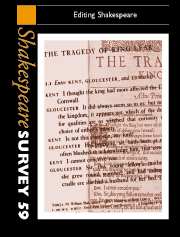Book contents
- Frontmatter
- Editing Shakespeare’s Plays in the Twentieth Century
- Crisis in Editing?
- On Being a General Editor
- Altering the Letter of Twelfth Night: ‘Some are born great’ and the Missing Signature
- ‘A Thousand Shylocks’: Orson Welles and The Merchant of Venice
- The Date and Authorship of Hand D’s Contribution to Sir Thomas More: Evidence from ‘Literature Online’
- Ferdinand’s Wife and Prospero’s Wise
- Editing Stefano’s Book
- Manuscript, Print and the Authentic Shakespeare: The Ireland Forgeries Again
- The Author, the Editor and the Translator: William Shakespeare, Alexander Chalmers and Sándor Petofi or the Nature of a Romantic Edition
- Women Edit Shakespeare
- The Shakespeare Edition in Industrial Capitalism
- Print and Electronic Editions Inspired by the New Variorum Hamlet Project
- The Evolution of Online Editing: Where Will it End?
- The Director as Shakespeare Editor
- The Editor as Translator
- Performance Editions, Editing and Editors
- Editing Collaborative Drama
- Will in the Universe: Shakespeare’s Sonnets, Plato’s Symposium, Alchemy and Renaissance Neoplatonism
- Giants and Enemies of God: The Relationship between Caliban and Prospero from the Perspective of Insular Literary Tradition
- Shakespeare’s Ages
- Who Wrote William Basse’s ‘Elegy on Shakespeare’?: Rediscovering a Poem Lost from the Donne Canon
- ‘Sometime a Paradox’: Shakespeare, Diderot and the Problem of Character
- Shakespeare Performances in England, 2005
- Professional Shakespeare Productions in the British Isles, January–December 2004
- The Year's Contributions to Shakespearian Study 1 Critical Studies
- 2 Shakespeare in Performance
- 3 Editions and Textual Studies
- Index
2 - Shakespeare in Performance
Published online by Cambridge University Press: 28 March 2007
- Frontmatter
- Editing Shakespeare’s Plays in the Twentieth Century
- Crisis in Editing?
- On Being a General Editor
- Altering the Letter of Twelfth Night: ‘Some are born great’ and the Missing Signature
- ‘A Thousand Shylocks’: Orson Welles and The Merchant of Venice
- The Date and Authorship of Hand D’s Contribution to Sir Thomas More: Evidence from ‘Literature Online’
- Ferdinand’s Wife and Prospero’s Wise
- Editing Stefano’s Book
- Manuscript, Print and the Authentic Shakespeare: The Ireland Forgeries Again
- The Author, the Editor and the Translator: William Shakespeare, Alexander Chalmers and Sándor Petofi or the Nature of a Romantic Edition
- Women Edit Shakespeare
- The Shakespeare Edition in Industrial Capitalism
- Print and Electronic Editions Inspired by the New Variorum Hamlet Project
- The Evolution of Online Editing: Where Will it End?
- The Director as Shakespeare Editor
- The Editor as Translator
- Performance Editions, Editing and Editors
- Editing Collaborative Drama
- Will in the Universe: Shakespeare’s Sonnets, Plato’s Symposium, Alchemy and Renaissance Neoplatonism
- Giants and Enemies of God: The Relationship between Caliban and Prospero from the Perspective of Insular Literary Tradition
- Shakespeare’s Ages
- Who Wrote William Basse’s ‘Elegy on Shakespeare’?: Rediscovering a Poem Lost from the Donne Canon
- ‘Sometime a Paradox’: Shakespeare, Diderot and the Problem of Character
- Shakespeare Performances in England, 2005
- Professional Shakespeare Productions in the British Isles, January–December 2004
- The Year's Contributions to Shakespearian Study 1 Critical Studies
- 2 Shakespeare in Performance
- 3 Editions and Textual Studies
- Index
Summary
Writing in the Guardian (13 July 2005) of the Royal Shakespeare’s plans for an international line-up of productions as its ‘Complete Works’ series in 2006, Gary Taylor resists any automatic rejoicing at Shakespeare’s geographical reach, observing mordantly that ‘Oxfam is an international organization, but so is. Whether an internationalist Shakespeare is the benign partner or the corporate exploiter (yes, I recognize the caveats which should be attached to both these characterizations) is an implicit question within and between a number of books on Shakespearian productions within and without the UK/US. The negative connotations of ‘globalization’ have taken over in recent years from the saccharine concept of the ‘global village’: can a worldwide Shakespeare be exonerated from those familiar but necessary charges of cultural imperialism? How far has performed Shakespeare around the globe been, as the marketers would put it, indigenized – and how far is an international McShakespeare merely a global theatrical franchise?
Sonia Massai’s collection World-Wide Shakespeares: Local Appropriations in Film and Performance is a timely intervention into this contested discussion. Her important, theoretically acute introduction begins with the subheading ‘local Shakespeares in a global context’, sounding like – and self-conscious about being – the tagline for a multi-national proud of its hegemonic ability superficially to adapt itself to a particular culture. Massai works intelligently with the problematic of interculturalism via Pierre Bourdieu’s notion of the ‘cultural field’, which substitutes for the author ‘the sum of critical and creative responses to his work’. Contributors to the volume assess a number of interactions between Shakespeare and local cultures – although largely from the institutional distance of European/American universities, and it begins firmly in the United States. Suzanne Gossett describes the audience’s movement, directed by Gower, between seven small stages for the Washington Shakespeare Company’s production of Pericles in 1998 as a programme note guides them through a historical journey of 1960s American idealism to 1990s disillusionment.
- Type
- Chapter
- Information
- Shakespeare Survey , pp. 368 - 375Publisher: Cambridge University PressPrint publication year: 2006

